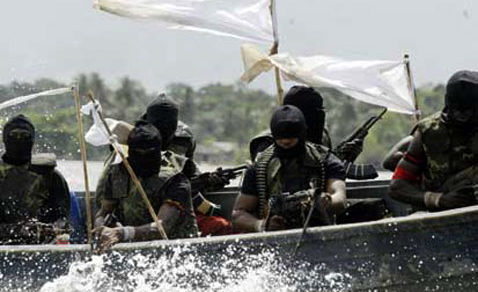BIMCO boss hits out at Nigerian piracy status quo

The departing CEO of international shipowning organisation BIMCO has hit out at Nigerian authorities’ complete failure to rein in the horrendous piracy situation in West Africa as well as the tacit complicity of oil majors not to speak out on the matter.
In a note to members entitled ‘We must speak the truth about Gulf of Guinea’, Angus Frew wrote: “In the past year, the complete absence of effective law enforcement against Nigerian pirates has allowed them to operate largely with impunity in the Gulf of Guinea and we must conclude that the current capacity building initiatives have had no effect whatsoever.”
The waters off Nigeria have become the world’s piracy hotspot over the last couple of years. However, not a single pirate has been apprehended by the Nigerian Navy since the start of 2019. During this period, Nigerian pirates were responsible for around 146 seafarers being kidnapped and held for ransom in Nigeria, four security guards were killed, one security guard was wounded, two seafarers died and a number of seafarers were wounded.
Frew, who steps down at BIMCO soon, wrote that the the situation in Nigeria is “completely unacceptable”.
“Senior officials in Nigeria appear unwilling to deploy their maritime security forces in a way that ensures that they live up to the international responsibilities they signed up to under the United Nations Convention on the Law of the Sea (UNCLOS),” Frew noted, going on to note the success the international naval coalition had a decade ago in fighting the piracy scourge off Somalia.
“Somali pirates operated from a failed state and attacked ships over a vast area of more than one million square nautical miles. Nigerian pirates operate from Nigeria and roam an area of no more than a quarter of that size,” Frew pointed out, adding: “It is by any standard a manageable law enforcement challenge, so why has the problem not been solved years ago? Why is this obvious breakdown of law and order tolerated by the international community? Why are Nigerian pirates allowed by the international community to operate freely from the shores of Nigeria and across the wider Gulf of Guinea? The answer you get is ‘it’s complex’.”
Frew maintained that part of the reason for the inaction arises out of an ambition by the international community to secure continued access to natural resources – especially oil – controlled by a Nigerian government. This leads, Frew suggested, to an unwillingness among governments and commercial organisations to lobby the Nigerian government to effectively combat the piracy problem.
“When the international community is not willing to push for safety and security for our seafarers, the ensuing policy results in – not surprisingly – status quo,” Frew wrote, imploring his members to actively call on governments to take decisive naval action against Nigerian pirates outside the 12 nautical mile limit of the coastal states’ territorial waters.

Let us Masters arm ourselves. We get all kinds of HSE-Training, so why am I not allowed to protect my crew with regards to this. Fire power is the most effective deterrant…Again, IMO wake up…try to do something for the lower rankings, not only follow the lead of the capital.
As a non seafarer I’m wondering how the pirates board ships at sea? Surely the crew are in a better position to repel an attack!
I’m comparing it to attacking a castle in olden times.
What am I missing here?